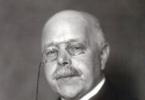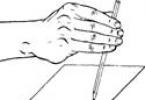Yesterday there was a failure. I wasn't hired.
I failed the test task. The position I applied for was that of a proofreader for our city newspaper. Everything was very fast and shameful. I came to the editorial office and received a “strip,” but a special one. Enlarged is one, and with ashipkas is two.
I read it quickly and noted 4 or 5 errors. The person who was talking to me looked and literally burst into tears. Because there were twice as many errors there.
Well, yes, the Chukchi is not a reader, the Chukchi is a writer. The person hiring was crying because he was already in despair - they had to hand over the page (this time real, real) to the press in 15 minutes, it was proofread by 5 people in turn, and after them she found exactly 5 errors. So the corrector needs a nosebleed. The last hope was on me, because... After reading my FB, I got the impression that “he’s a decent person, he writes on FB with commas.” But I didn’t justify it :(
But what makes me happy is that somewhere else they still monitor the level and do not hire such “literate” people for work.
Everything, of course, “goes away”, is quickly washed away from the brain. And somewhere it’s just carelessness. I think if I hadn’t been in a hurry yesterday, I would have bitten it with my teeth and would have seen a few more mistakes. You are the one to blame.
The book is small, an enlarged pocket size, the size of two of my palms. In principle, it will fit into any handbag. It’s great to look through before the interview, heh heh heh.
The most difficult and “nasty” mistakes in the Russian language

Some things are not very applicable, I can’t imagine where to get 15 minutes of your life to rewrite someone else’s text. Besides, in 15 minutes of writing my hand will fall off! But we all know that “reading” just works - the more you read, the higher your literacy. Photographic recording, nothing magical.

But checking your spelling right there is great fun. Just like yesterday.

Complex rules in simple terms
Artist: Vadim Gusev
Publishing house DETGIZ, 2017
Series: I read without hesitation
ISBN: 978-5-8452-0294-9 all
A book about letters, in poetic form. This book, in my opinion, is needed in every home where there are children from 3 to 4 years old.
The book was published beautifully! Thick paper, large font.
And the wonderful poems of Alexander Shibaev are accompanied by no less wonderful drawings by Vadim Gusev. Vadim Gusev's drawings are reminiscent of poster graphics from the times of the USSR.
This book has history.
It began in 1965 with a thin little book from the book “The Letter Got Lost,” which had only 10 pages + a cover. And in 1981 the book “Native Language, Be Friends with Me” was published. Alexander Shibaev finished it in the hospital and did not live to see its publication. Vadim Gusev “finished” the book himself, also acting as the compiler of the book.
The book has grown - 128 pages. There are four books in one book. After each book there are also Appendixes.
I liked the book both in content and execution.
By the way, now you can buy thin books from the “Rech” duo of the Shibaev - Gusev duo. I preferred to buy EVERYTHING in one book! And more practical and economical.
The first book is called “Here they are”.
It tells about letters and the peculiarities of their writing. Ideal for children who are just starting to learn letters. This is the part we are currently reading!
Poems are easy to learn and remember.
Look, look:
Five neighbors in the alphabet -
Letters “G”, “D”, “E”, “E”, “F” -
Everyone is grieving for the hedgehog
They always think: “WHERE IS THE HEDGEHOG?”
You won't console me
You won't stop...
or
"N" put on a belt,
“I” put on a belt.
The letter “N” is put on straight,
letter "I" - obliquely"
Second book - "The letter got lost".
This is for older children. This is a book about how just one letter can completely change a word, turn the whole meaning around, confuse.
The mixed up letter is highlighted in a different color, the child must guess what it should actually be instead.
Mom with b I went with glasses
Along the road, along the village...
Daughter is a barrel.
Everything is easy and simple. Moreover, on the page above the poem there is a hint - a picture.
Third book - "Magic Words".
These are stories about how different words can be made from the same syllables.
- Why are you keeping silent?
- When I eat,
I'm like a fish Not m- Not m- Not m,
And let me Not -m Not -m Not
Have lunch in silence!
The fourth book - “Oh, this grammar!”
Poems about punctuation marks, prepositions, the particle “not”.
Question mark
Forever thinking
Above the meaning
Bent
Rocker...
This book is simply a masterpiece. This is probably the best Russian language textbook I know!!! Even I, an adult aunt, learned a lot of new things for myself.
Every child should have a book like this!









The purpose of the lesson: formation of educational competencies: informational, communicative, reflective, by 4th grade students in the subject area "Russian language" on the topic "Native language - be friends with me."
Learning objectives:
1. Learning objectives aimed at achieving personal results:
The ability to self-assess based on the criterion of success in educational activities.
Personal results:
Establish a connection between the purpose of educational activity and its motive;
Determine common rules of behavior for everyone.
Cognitive UUD:
Find answers to questions using your life experience and information received in class;
Development of thinking operations: comparison, comparison, analysis, synthesis and generalization.
Communicative UUD:
Be able to express your thoughts in oral speech, listen and understand the speech of others.
Regulatory UUD:
Developing students’ ability to independently develop and apply criteria and methods of differentiated assessment in educational activities.
"Native language - be friends with me."
Children, how do you understand this phrase?
Children's statements.
Language is the most amazing thing in the world.
The Russian language in the form to which we are accustomed is only a little over 300 years old. For language this is “childhood”.
Today we will take a short trip to the country of the Russian language.
To do this, we will divide you into teams.
Look at the picture. The Proto-Slavic language is depicted here, which became the father of three sons of languages: East Slavic, South Slavic and West Slavic. They, in turn, later gave birth to smaller languages to their grandchildren.
Who knows in what city and on what square the monument to Cyril and Methodius was erected? (Moscow, Slavyanskaya Square).
On the ABC book page
Thirty-three heroes.
Sages - heroes
Every literate person knows.
(Alphabet)
Previously, the alphabet was called Cyrillic, in honor of one of the brothers who created the Cyrillic alphabet. From that time (863) in Rus' until the 17th century. There were two languages: Old Russian and Old Church Slavonic.
I I question
Which nations celebrate the birthday of Slavic writing? (Russians, Belarusians, Ukrainians, Bulgarians, Serbs).
III question
The Old Church Slavonic language had a great influence on the Russian language. Many incomplete words have entered our language. So, instead of original Russian words, you need to write down those that are Old Slavonic in origin, but used in the modern Russian language.
Time is time
Vered - harm
Vorog - enemy
Chorebry - brave
Solodky - sweet
Many words were created by the people, some “came” to us from afar, from other countries. Remember and write down from which language
words came to us
School - from German
Briefcase - from French
Candy - from Italian
Football - from English
Remember the words and fill in the missing letters:
Oro - -olo-
Oro - -olo-
Oro - -olo-
Oro - -olo-
Oro- -olo-
Decipher the words, find the “extra” word.
ZHYIL (skis)
ANSKI (sled)
KYONK (skates)
NOLS(elephant)
Question VII
Find and write down the words that are jumbled.
YO HUNDRED KI FOR
RO AS RO RA
L I T G O L
RAD BO TA
(hedgehogs, table, rose, city, aster, work)
The Russian language is powerful and beautiful. Folk proverbs and sayings bring it to life. Let's listen to what outstanding Russian writers wrote about the Russian language. ( Children performing)
"It is impossible to create a language - it is created by the people." V, G, Belinsky.
“If you don’t know how to wield an ax, you can’t cut down a tree, but the language is also a tool, a musical instrument, and you need to learn how to use it easily and beautifully.” M, Gorky
"Language is the centuries-old work of an entire generation." V, I, Dahl
"Language is the history of the people" A, I, Kuprin
"The greatest wealth of a people is its language " M, A, Sholokhov
Guys, let's summarize our lesson. What can be said about the Russian language?
Children's statements.
Teacher:
Our language is beautiful -
Rich and sonorous
Either powerful and passionate, or tenderly melodious.
He also has a smile,
Both accuracy and affection.
Written by him
And stories and fairy tales -
Magic pages
Exciting books!
Love and keep
Our great language!!!
One of the best books on teaching children the alphabet and rules of the Russian language through games, an excellent reissue of a book familiar to many from Soviet times. The method for memorizing the writing of letters is based on associative funny pictures, which in the new edition have become brighter and even more interesting.
Poems, riddles, funny drawings make the process of learning letters interesting and joyful for kids.
“How did this book grow?
As everybody. How are you. As everybody.
At first she was very small. In 1965 (you were not yet born) it had only ten pages and a cover, and it was not yet called “language”, but only “letter”. Completely - “The letter got lost.” Our collaboration with the special poet Alexander Aleksandrovich Shibaev began with this book. 
I had to finish it alone.
It was very interesting for me to play language, such a big, very complex game in which you need to think so much!
This game is played with signs: punctuation marks, letters, words that form letters - all these are signs. 
Every game is played according to the rules. You need to know the rules. Those who don’t even know simple rules are laughed at. "He (she, they) is funny!" We have fun - we know how to do it right! Shibaev's poems laugh with us!
I drew what Alexander Alexandrovich wanted to write. He wrote something that was interesting for me to draw. Together again - fun!
And it’s really fun to be with you. All together."
For younger children.
Publisher: Detgiz.
Simple, bright and memorable drawings.
The quality of the book is excellent: large format (A4), hard varnished cover. White offset smooth thick paper inside. Clear and very large font, small children can read. Illustrations on every page.
Contents of the book “Native language, be friends with me”
Here they are
Continuation Application
The letter got lost
Continuation Application
Magic words
Continuation Application
Oh, this grammar!
Continuation Application
Various absurdities
This book contains 4 books at once, in one volume, very convenient!



